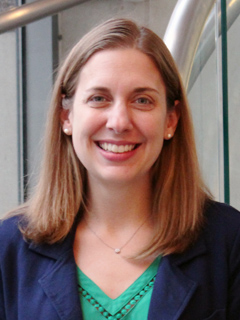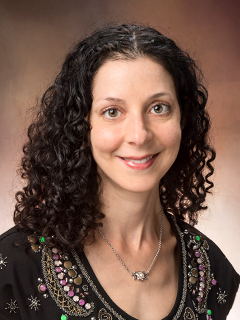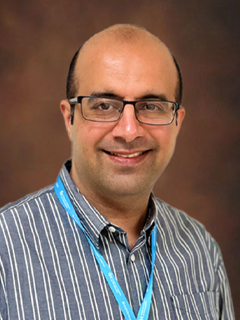HOW CAN WE HELP YOU? Call 1-800-TRY-CHOP
In This Section
Personalized CRISPR Gene Editing, Stem Cell Transplants, AI Diagnostics

In a historic medical breakthrough, researchers from Children's Hospital of Philadelphia and the Perelman School of Medicine at the University of Pennsylvania successfully treated the first patient with customized CRISPR gene editing. Also in this week's news, a new study identifies potential for stem cell transplants to treat monogenic inflammatory bowel disease, and investigators use artificial intelligence in diagnostic imaging of the liver.
CHOP-Penn Team Performs First Personalized CRISPR Gene-editing Therapy
A collaborative team from CHOP and Penn Medicine performed the first customized CRISPR gene editing to treat an infant, KJ, with a rare metabolic disease known as severe carbamoyl phosphate synthetase 1 (CPS1) deficiency.
This groundbreaking study was published in the New England Journal of Medicine and has since been covered by major news outlets across the country, including 6ABC, The New York Times, and People.
"Years and years of progress in gene editing and collaboration between researchers and clinicians made this moment possible, and while KJ is just one patient, we hope he is the first of many to benefit from a methodology that can be scaled to fit an individual patient's needs," said Rebecca Ahrens-Nicklas, MD, PhD, Director of the Gene Therapy for Inherited Metabolic Disorders Frontier Program at CHOP and Assistant Professor of Pediatrics at the Perelman School of Medicine at Penn.
Dr. Ahrens-Nicklas developed the personalized therapy alongside Kiran Musunuru, MD, PhD, the Barry J. Gertz Professor for Translational Research at Penn. After identifying KJ's specific variant of CPS1, their team designed and manufactured a base-editing therapy delivered via lipid nanoparticles to the liver to correct KJ's faulty enzyme.
Learn more in this Cornerstone article and this CHOP news release.
CHOP Investigator Receives Award from 2025 Pathogenesis of Infectious Disease Program
The Burroughs Wellcome Fund announced the award recipients of the 2025 Pathogenesis of Infectious Disease (PATH) program, including CHOP Investigator Joseph Zackular, PhD, Assistant Professor of Pathology and Laboratory Medicine.
The award funds research that advances understanding of the interplay between human biology and infectious agents. Dr. Zackular will receive a five-year $505,000 award in support of his research on reprogramming of the early life gut by Clostridioides difficile.
"I'm incredibly grateful to the Burroughs Wellcome Fund for supporting my team's research, and I am honored to join such an amazing community of leaders in the field of infectious diseases," Dr. Zackular said. "Support from the PATH award will provide my team the flexibility to explore new and exciting areas of investigation focused on the impact of pathogens, like C. difficile, in early life. I am deeply thankful to the members of the Zackular Laboratory who made this all possible."
At CHOP, Dr. Zackular and his research team focus on understanding how interactions between the host, gut microbiota, and pathogenic microbes impact human health and disease, with a special emphasis on C. difficile.
He also leads collaborative efforts across the institution and Penn as one of the Co-directors of the Center for Microbial Medicine, which is geared toward integrating personalized microbiome medicine and developing cutting-edge microbiome-based therapeutics and clinical trials to move discoveries quickly from bench to bedside.
Congratulations, Dr. Zackular!
Read more in the Burroughs Wellcome Fund announcement.
Stem Cell Transplant Demonstrates Curative Potential for Inflammatory Bowel Disease
A retrospective study published in Clinical Gastroenterology and Hepatology revealed allogenic hematopoietic stem cell transplantation (HSCT) could be a highly effective method to treat young patients with monogenic inflammatory bowel disease (IBD), which is caused by single-gene defects. Results indicated a 100% survival rate, and 92% of patients achieved sustained medication-free remission at the most recent follow-up.
"These results, along with similar findings in the literature, offer new hope for our patients with this severe form of IBD," said senior study author Judith Kelsen, MD, Program Director of the Very Early Onset (VEO)-IBD Program and Co-leader of the Center for Inflammatory Bowel Disease Frontier Program at CHOP. "Our experience clearly indicates that a multidisciplinary collaborative team approach is essential for identifying appropriate transplant candidates. The partnership between the VEO-IBD, immunology, and bone and marrow transplant teams at CHOP has been instrumental in determining suitable patients for transplant."
Investigators in the Division of Gastroenterology, Hepatology, and Nutrition and the Program for Integrated Immunodeficiency and Cellular Therapy studied 25 patients treated with HSCT between 2012 and 2022.
Although this study is specific to monogenic IBD, these insights could help inform therapeutic treatment options for the broader IBD patient population.
Read more in this CHOP news release.
ChatGPT-4 Demonstrates Capability for AI-driven Diagnostic Imaging of Liver
Researchers from CHOP and Penn, including Research Scientist and first author, Laith Sultan, MD, MPH; Sudha Anupindi, MD, Associate Radiologist- in-chief and Chief of the Division of Body Imaging; and CHOP Radiologist-in-Chief, Kassa Darge, MD, PhD; examined the efficacy of large language model, ChatGPT-4, in liver ultrasound analysis. The findings, published in the Journal of Medical Internet Research AI, demonstrated that ChatGPT-4 could be used to support liver disease diagnosis with high accuracy.
"Foundational large language models like ChatGPT have the potential to transform medical imaging diagnostics by serving as intelligent assistants to radiologists," Dr. Sultan said. "This support could be especially impactful in resource-limited settings and for clinicians still in training, helping to bridge gaps in expertise and improve diagnostic accuracy and efficiency."
To determine the ability of ChatGPT-4 to differentiate fibrosis, steatosis, and normal liver tissue, investigators used the AI technology to analyze 70 grayscale ultrasound images from a preclinical liver disease model. They compared the results to those obtained using Interactive Data Language (IDL), which is traditional image analysis software.
Compared to IDL, ChatGPT-4 showed slightly lower sensitivity when discriminating between nine textural features — such as echo intensity and heterogeneity — but it outperformed IDL's processing efficiency, reducing analysis time by 40%.
ICYMI
Catch up on our headlines from our May 16 In The News:
- Susan Furth Honored as Outstanding Executive
- CHOP Investigators Named Co-leaders of Pediatric Oncology Research Program
- Study Findings Suggest New Standard of Care for Hereditary Neuroblastoma Linked to ALK Mutation
- Congratulations to CHOP's 2025 Poster Day Awardees
- CHOP Researchers Share Expertise at Joint Concussion Symposia
- Exploring Three Decades of Population Health Advancement
- Cellicon Valley '25: Experts Unveil the Future of Cell and Gene Therapies
Keep up with our news, stories, and updates in real time by following us on X, Facebook, LinkedIn, Instagram, and Bluesky. Meet the minds behind the science in the Bench to Bedside podcast. Or subscribe to our newsletter to receive an email every other Friday.
Have you published a paper and want to share your findings? Contact Research Creative Services* so we can celebrate your research success stories on Cornerstone.
*CHOP login required.





